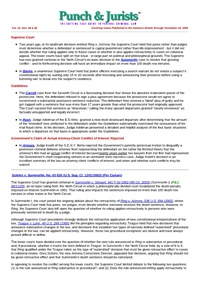Ultimately this is a decision about the limited authority of the federal courts to conduct habeas review of state court rulings - although it delves into the complex area of mental retardation claims. Here, the Supreme Court overturned a Ninth Circuit ruling that had ordered the State of Arizona …
This case addressed whether the Court’s decision in Ring v. Arizona, 536 U.S. 584 (2002) (which held that juries (not judges) must determine the presence of aggravating factors qualifying a defendant for the death penalty), should be applied retroactively to cases already final on direct review. The general rule, …
In this case, the Government sought to disqualify Stacey Richman of the Law Offices of Murray Richman from representing the defendant, Gustavo Armaza, in his criminal case. It’s case against Armaza was apparently predicated on the testimony of a cooperating witness, one Alvin Blassingame, and it wanted to make …
As he so often does, Judge Adelman has put a bit of common sense and reality back into the concept of using the “intended loss” of a crime as the true measure of the appropriate punishment under the Guidelines.
Under the Guidelines, the amount of the loss that results …
Plaintiff prisoner filed an action claiming that a new policy concerning placement in halfway houses violated the Ex Post Facto Clause, U.S. Const. art. I, § 9, cl. 3. The United States District Court for the District of Columbia issued a preliminary injunction that prohibited the Federal Bureau of …
This decision is noted for its detailed analysis of the “attenuation doctrine” - a judicially created exception to the Fourth Amendment’s exclusionary rule under which the courts justify the use of tainted evidence if they find that the connection between the illegal police conduct and the discovery and seizure …
Here, clarifying and somewhat amplifying its earlier decision in U.S. v. Gonzalez, 281 F.3d 38 (2nd Cir. 2002), the Second Circuit held that under U.S.S.G. § 5K2.20, the “absence or presence of spontaneity alone never determines whether criminal conduct is aberrant behavior. A non-spontaneous criminal act might be aberrant …
Here the Court held that police officers executing a search warrant do not violate a suspect’s constitutional rights by waiting only 15 to 20 seconds after knocking and announcing their presence before breaking into his residence.
On July 15th, 1998, Las Vegas police officers executed a warrant to …
Here the Court vacated a 262 month sentence and remanded for resentencing at a much lower range, finding the various upward departures recommended by the prosecutor and imposed by the court were clearly erroneous and ignored the facts of the case.
This case speaks volumes about the dangers …
In a decision that attacks a critical and frequently used element of many of the Government’s cases against alleged terrorists, a divided panel from the Ninth Circuit held in this case that a portion of the Federal Antiterrorism Laws (18 U.S.C. § 2339B), which makes it a crime to …
